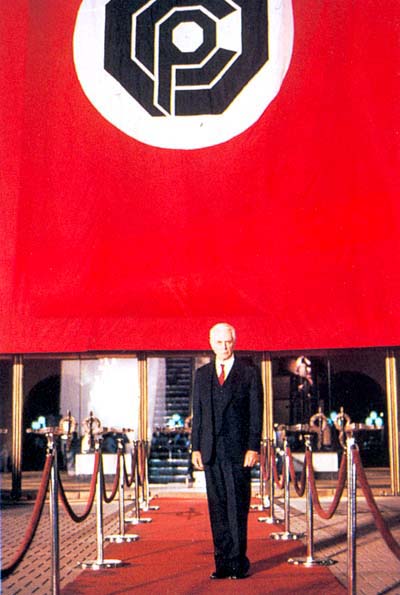
Second in the series of indeterminate length, Recolonizing Detroit
The second story that spawned this series, was about Paul Romer’s “charter cities” idea. (Or as Metafilter put it, “neocolonial OCP-like company towns.“) Romer’s plan is get poor countries to cede governmental control of some unpopulated land to a rich foreign country and its investors, and let them build a city there. The city grows, becomes prosperous because capitalism and free markets, and then the rest of the country slowly begins to imitate the charter city. Essentially, he’s proposing creating a new Hong Kong, but without the warships and the opium.
Romer’s rationale for his charter cities is based on his work on economic growth. Prior to Romer, economists attempted to explain economic growth through hours worked, how skilled the workforce was, and physical capital. Romer added “ideas,” later termed “rules,” to the mix. Rules were laws and cultural norms of a society. Rules attempted to explain why even supposedly wealthy and educated countries could do poorly. Charter cities attempt to import rules, and the credible enforcement of these rules, from one country to another.
His first serious attempt to found a charter city was in Madagascar. Unfortunately…
Even as Romer was meeting with [Malagasy president Marc] Ravalomanana, the president’s main political opponent was sniping at the proposed lease of farmland to Daewoo, and the idea of giving up vast swaths of territory to foreigners was growing increasingly unpopular. The arrangement was denounced as treason, and public protests gathered momentum, eventually turning violent. In late January 2009, protesters tossed homemade grenades at radio and TV stations that Ravalomanana owned; looters ransacked his chain of supermarkets. In February, guards opened fire on marchers in front of the presidential palace, killing 28 civilians. At this, units of the army mutinied. Soon, Ravalomanana was forced out of office.
Oops.
Colonization has always been a messy. It’s losing control of your home and control of your lives. That’s why colonists have always brought the army with them. Romer is quick to point out that by creating new cities, no one is forced into this neo-colonial experiment, but the truth is somewhat more complex than that.
Libertarians would say that protections and legal accountability aren’t necessary because if the system wasn’t safe and accountable, then no one would go there, but the real world is filled with horrendous conditions that people choose simply because they’re perceived as being the least bad option. Whether it’s Piracy in Somalia, or Massey Energy in Appalachia, the calculus is the same. The sad truth is, these problems rarely, if ever, work themselves out.

When you start considering the practicality of a charter city, it begins to resemble a Gibsonesque corporate city-state, or perhaps the Dutch and British East India companies. The city needs a security force (perhaps even more of an army than simply police), and infrastructure that it can’t necessarily get from the host country (e.g. water and electricity). If the city is successful, shantytowns will spring up full of those who want in, but the city can’t accept; an early Shenzhen, if you will. Hopefully these shantys might not turn out so bad in the long run; think contemporary Shenzhen.
To be fair, Romer is aware of this. Developing professional police and (quasi)governmental officers from a culture that hasn’t had them in a long while (if ever) is very hard. Initially, these these jobs will need to be filled and overseen by the foreign power, since the idea is to “change the rules,” and you can’t do that by simply importing those that don’t follow the new rules. So right when this charter city launches, it is going to look a lot less like a financial investment, and more like an occupation, and that’s going to be a problem.
Since these colonies are being established in countries that’s not entirely politically stable, and given the inherent opposition to colonial masters, what happens if the host moves to take over the colony through extra-legal means (i.e. militarily), possibly being couched in the language of nationalization? Does the leasee let the city by nationalized, or do they defend it militarily? That was certainly the case during colonialism’s heyday. During the invasion of Iraq, there were accusations that it was a war for oil and the Bush Administration’s business allies. Sending troops to oust the indigenous military from its own territory, and prevent the nationalization of companies, would seem to be exceedingly transparent.

Perhaps instead, a kind of corporate funded dirty war would ensue. United Fruit Company (since renamed Chiquita) (“We Put the ‘Banana’ in ‘Banana Republic!'”) and the CIA frequently supported illegal, corrupt, and violent regimes to promote their will. (See operations PBSUCCESS, PBFORTUNE, and PBHISTORY.) When Chile completed the nationalization of the copper industry in 1971, there was outrage on Wall Street and in the Nixon Administration. This outrage manifested as the CIA’s and International Telephone & Telegraph’s financial support for Pinochet’s military junta, against Allende’s democratically elected government. (“[T]he issues are much too important for the Chilean voters to be left to decide for themselves.” – Henry Kissinger) Today, Shell Oil supports Nigerian militias, in order to pacify the population of the Niger River Delta.
History shows us that when given the opportunity, that corporatists will actively support any local group – legal or illegal – that will protect and extend their profiteering. Would they – could they – do this to protect a charter city? The city is governed by a wealthy, presumably (but not necessarily) democratic nation, with all the various laws that prevent funding of insurgent groups. Arguably the companies may not be able to fund these groups through their colonial offices, but if they had a subsidiary in the host nation to which to funnel the funds…